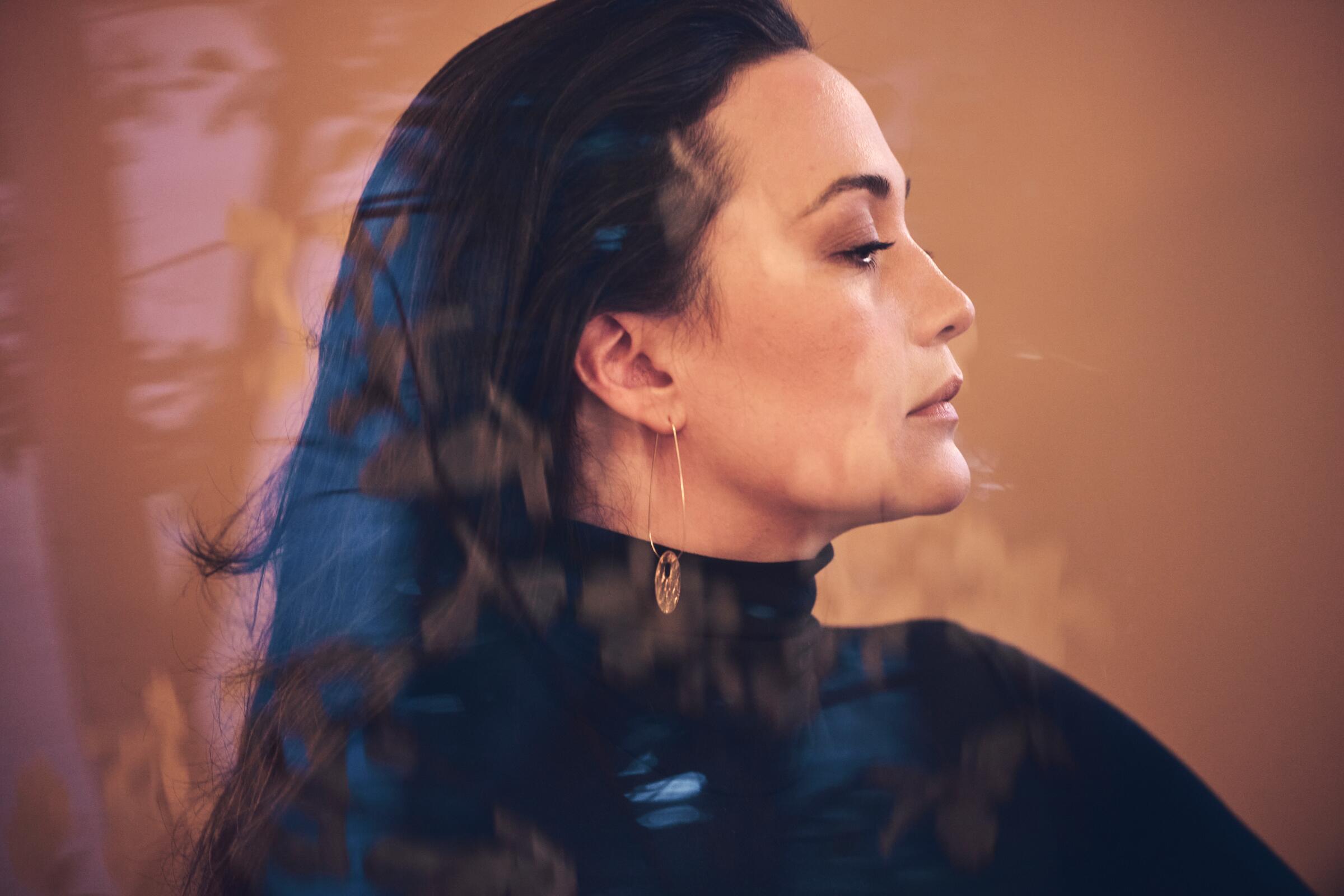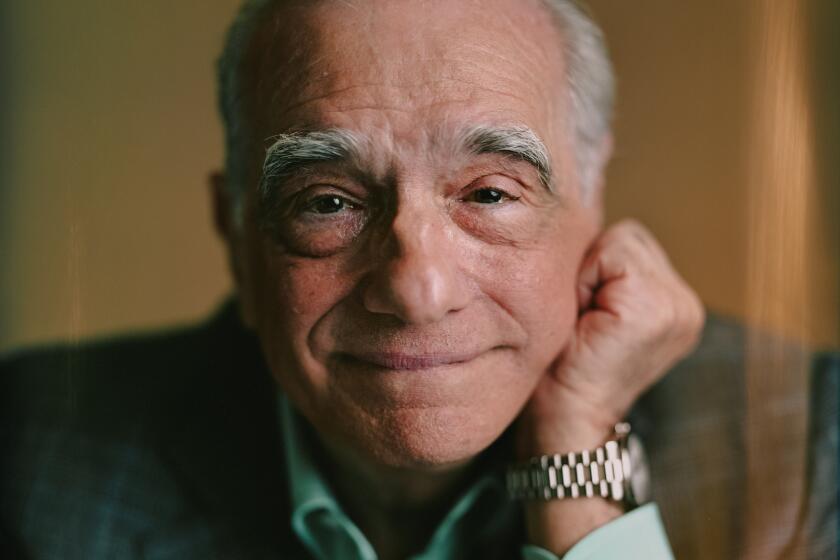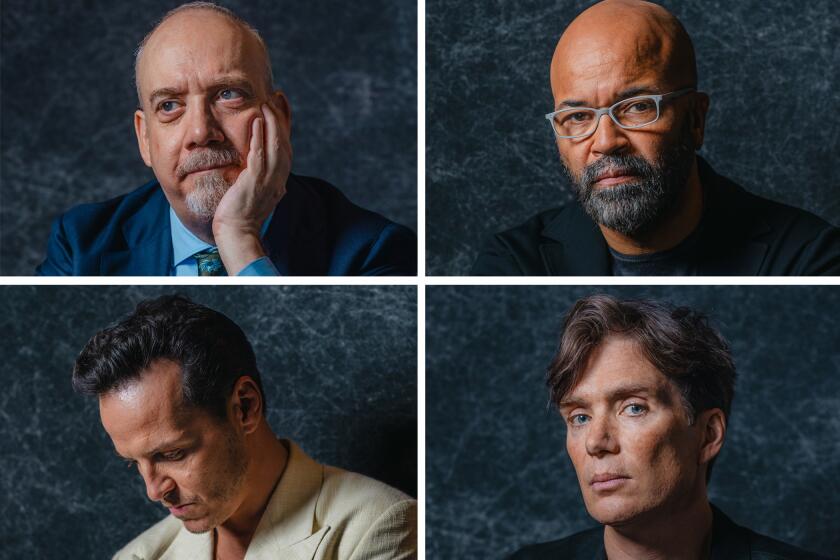Glenn Whipp covers film and television for the Los Angeles Times and serves as columnist for The Envelope, The Times’ awards season publication.
- Share via
1
When all this is over, when Lily Gladstone no longer has to discuss and dissect and get all dressed up to celebrate “Killers of the Flower Moon,” the movie that first came into her life nearly five years ago and has now propelled her into history as the first Native American to earn an Oscar nomination for lead actress, she’s going to head back home to her family in suburban Seattle. Gladstone moved in with her parents a few years ago to help take care of her special-needs uncle and her grandmother, who died last summer after battling dementia. Her immediate plan: Pay off her parents’ mortgage this year. Next step: Carve out a space for herself nearby.
“I would love to build a treehouse in their backyard for me to go live in,” Gladstone says, smiling. “I’d be happy.”
This makes complete sense, as Gladstone does really enjoy talking about how much she loves the Ewoks in “Return of the Jedi,” the fierce, furry little creatures fighting the Empire in the forests on the moon of Endor. The Ewoks’ scenes in the “Star Wars” film were shot in California’s Redwood National and State Parks, where Gladstone’s mother, Betty, spent a good part of her pregnancy carrying her. Gladstone finally visited the area when she was 21, feeling an immediate familiarity. And it occurred to her why she and so many other Native kids loved the Ewoks: They symbolized Indigenous resistance.
“You could make the argument that they’re the ones that bring down the Empire,” Gladstone says, and then spends a couple of minutes making that precise case. Back when she was 5, her parents assured her that she shouldn’t be upset about the Ewoks getting hurt because they were just actors wearing costumes.
The 81-year-old director talks about his decade in L.A., using film to find his better self and why his next movie will be about the teachings of Jesus.
“And since I wanted to be an Ewok, that made me think, ‘Hey, better become an actor,’” Gladstone says. At the Golden Globes this year, she ran into Harrison Ford and told him that “Return of the Jedi” was the reason she wanted to be an actor. “Me, too!” he responded. Then he helped her time her bathroom break so she wouldn’t miss her category.
For Gladstone, 37, the job has had its ups and downs. In 2019, the year she was first approached to play Mollie Kyle, the Osage woman who suffers as her family and friends are murdered for the rights to their oil rich Oklahoma land in “Killers of the Flower Moon,” Gladstone patched together enough income to break the poverty line. That had never happened before. Then the pandemic shut life down, and Gladstone thought, not for the first time, about quitting the business.
She doesn’t want to be too dramatic about this pivot point in her career. As she has navigated the awards season the last few months, starting with the long ovation she received at the “Killers” premiere at Cannes, certain narratives have emerged — and she’s happy to chip away at them. (No, she doesn’t find “Yellowstone” delusional — just the remarks by its creator, Taylor Sheridan, saying that his 2017 film “Wind River” “changed a law” affecting violence against Indigenous people.)
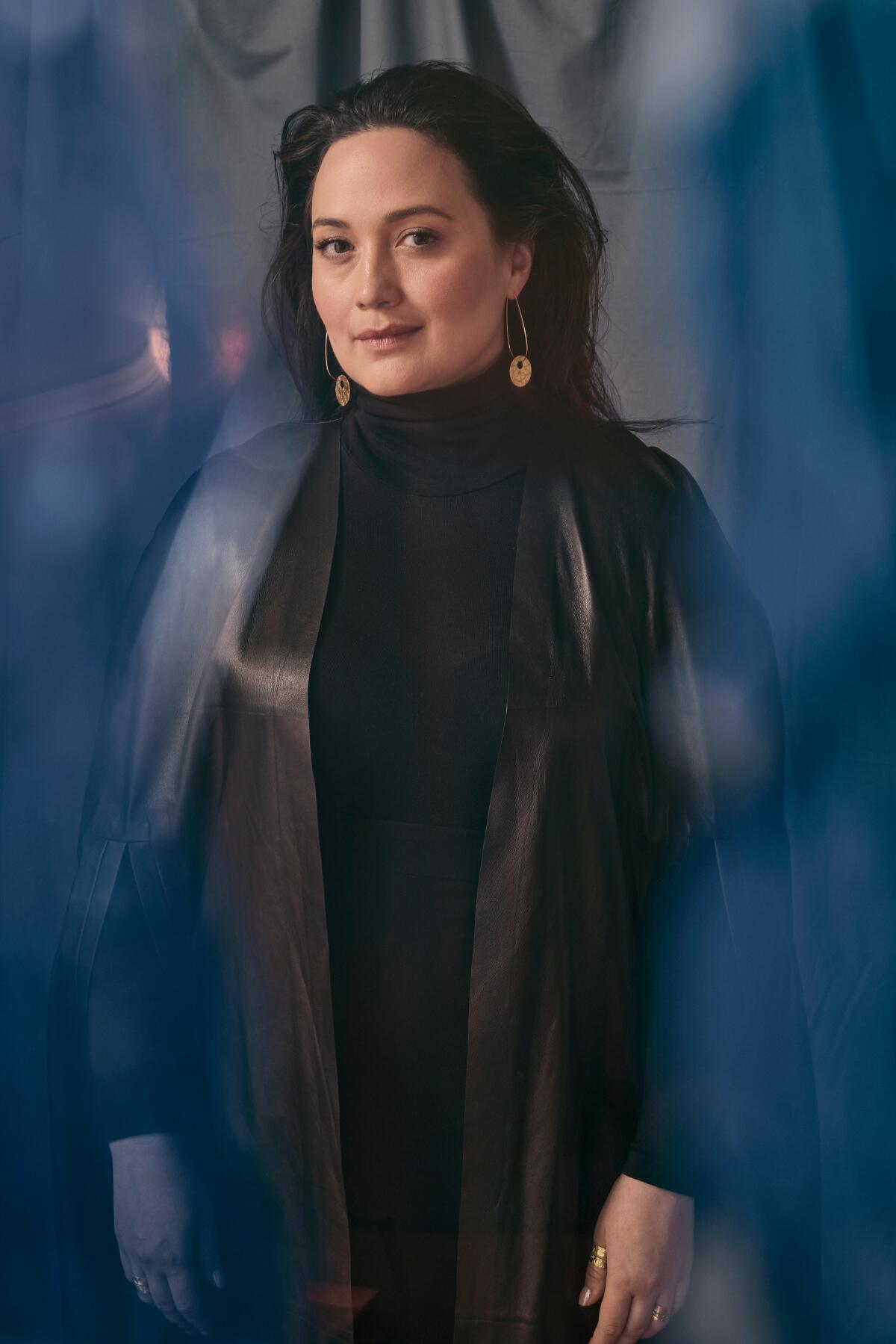
Lily Gladstone had pinned her hopes for work on “independent film and theater. But ... that doesn’t really go too far sometimes.”
(Ramona Rosales / For The Times)
So when Gladstone talks about stopping acting, she says it would have been a pause. “Quitting with a lowercase ‘q’” is how she puts it.
Gladstone had been there once before, not long after her breakthrough role as a lonely ranch hand in Kelly Reichardt’s 2016 female-driven set of prairie tales, “Certain Women.” Gladstone won several critics prizes for her tender turn, including an honor from the Los Angeles Film Critics Assn. She thought the notices would put her on the map, and they did spark a few more auditions than usual. But it wasn’t long before she thought about maybe throwing in the towel, settling into a job with a nonprofit theater in Missoula, Mont., and learning to hone her grant-writing chops.
“I think a lot of actors reach that point where you bargain with your passion and the reality of the business,” Gladstone says, sipping her coffee, which she takes with honey. “I always knew I’d struggle to be cast in commercial and studio films and that my niche would be independent film and theater. But ... that doesn’t really go too far sometimes.”
When the “Killers of the Flower Moon” casting directors first contacted her for the film in 2019, Mollie had just three scenes in the screenplay. It was a Martin Scorsese movie, so it wasn’t as if she was going to pass. Gladstone, whose father is Blackfeet and Nez Perce, figured she’d try to land the role and then do what Native American actors too often have to do — try to influence and reshape the role to make it authentic and meaningful.
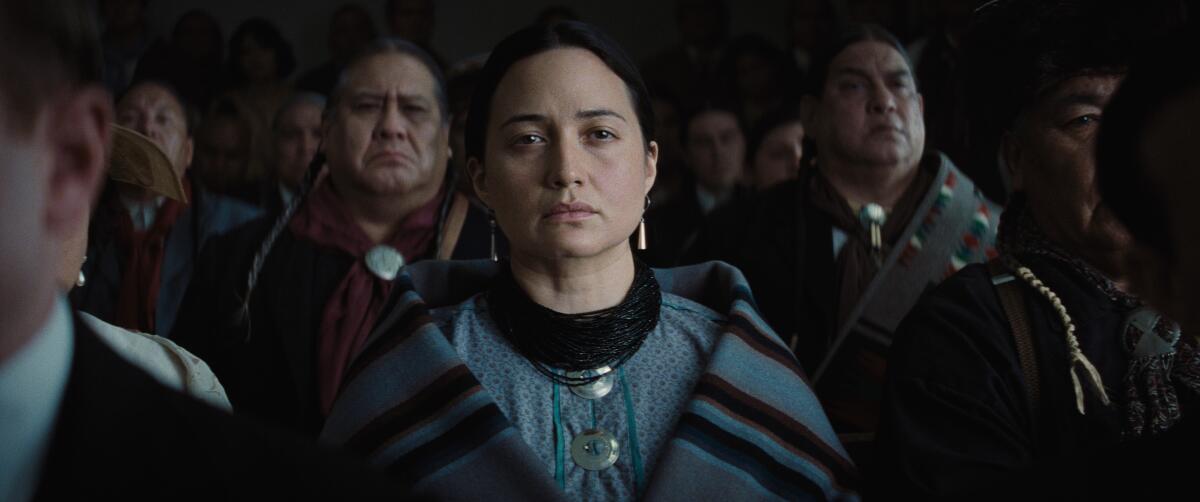
Lily Gladstone in a courtroom scene in “Killers of the Flower Moon.”
(Apple TV+)
But then the pandemic put the movie on hold and, simultaneously, elevated her duties at home, taking care of her uncle, her grandmother and a father whose work as a boilermaker rigger left him with a compromised immune system. “It’s a gift that I embrace,” Gladstone says of eldercare. Meanwhile, invasive hornets began showing up in Washington, posing a threat to the state’s bee population. (Ah, 2020.) Gladstone went online to apply for a seasonal data-analytics job tracking the hornets for the state’s department of agriculture. Just as she pulled out her debit card for the application, an email notice popped up on her screen: Skype with Martin Scorsese.
“Like, that second,” Gladstone says, shaking her head. She learned that Scorsese had reshaped the screenplay, focusing more on Mollie and the poisoned relationship with her husband, Ernest (played by Leonardo DiCaprio). It wasn’t long before Scorsese cast her in the role that would change her life forever.
“I did a follow-up Zoom with her and Leo after that first call,” Scorsese told me last year. “But I already knew. Leo was asking me, ‘Are you sure?’ I was sure. Lily possesses a presence that you can’t teach. She trusts the quiet. She trusts that the power of her presence can come from being still. To be quite frank, I can’t imagine the movie without her.”
Gladstone has been spending much of January holed up in a Beverly Hills hotel, her base of operations as she attends awards shows and continues to promote “Killers.” A Valentino dress, the custom gown Gladstone’s mother wore to the Golden Globes, hangs in her room’s closet. They’re still waiting to hear if they might keep it.
Our BuzzMeter film experts are back to predict what Oscar voters will nominate in 10 Academy Awards categories. Vote in the online polls!
In between events, Gladstone recently managed to visit Native filmmaker friends in Tulsa for a few days to brainstorm ideas on some projects and then pop over to Oklahoma City for a Jason Isbell concert. She’d like to bring both her mom and dad to the Oscars. “We’ll be the masked family,” she says. “They’re so happy and proud.” She plans to soon announce a distribution deal for “Fancy Dance,” a drama about the challenges Native women face that premiered at Sundance last year. Also on tap is a starring role in “Memory Police,” a twisty sci-fi parable written by Charlie Kaufman (“Being John Malkovich,” “Adaptation”).
Lately, Gladstone has been thinking about something “Reservation Dogs” creator Sterlin Harjo told her: If you’re the person who kicks the door down, your job is to stay in the door and keep it open. You just don’t run through it, because if you do, it’ll shut behind you.
“This is a moment for all of us,” Gladstone says of her historic nomination, news she shared with her parents in a tearful Facetime call. “It’s a lot to put on one person to represent an entire group of people who have been unrepresented for so long.”
“It’s overwhelming and overdue,” she continues. “The stories of our Indigenous people have shaped the very foundational fabric of our modern day. And so much of that is just not known, not felt, not acknowledged. I’m grateful, but it’s not going to be the last. Not by a long shot.”
Gladstone smiles and lets out a sigh, finishing the last of her coffee.
“I’ve said this a number of times to people I’m close with ... I’m just so glad this big breakthrough happened to me in my late 30s rather than my early 20s,” Gladstone says. “I really care about all the young ladies and men that are coming up behind me. I’m grateful that I’m breaking through at a time where there’s been these incredible shifts in our industry. Cynical people want to belittle moments like this, but it’s just about seeing the excellence in all these untold stories. That’s exciting.”
She holds out her hand and offers a promise: “Native women are unstoppable. We’re an unmanageable lot, and you’re going to be hearing a lot from us moving forward. And you won’t be disappointed.”
Times staff writer Jen Yamato contributed to this story.
